Special Delivery
Byrd Alzheimer’s Institute gets USF Health’s first PET/CT scan
It was delivered on schedule Aug. 1 — all 13,000 pounds of the $1.3-million-dollar baby. By crane, not by stork.
With precision logistics, USF Health’s first PET/CT scan system was safely hoisted for installation onto the second floor of the Byrd Alzheimer’s Institute. The high-tech neuroimaging equipment will be a key piece of the Institute’s new Complete Alzheimer’s C.A.R.E. (Clinical Assessment Research & Education) Center, scheduled to open later this year.
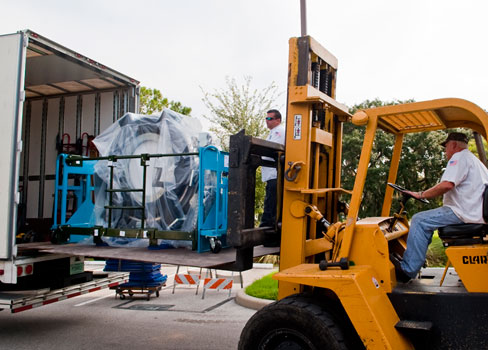
Delivery of the 13,000 pound PET/CT scan, including the instrumentation
needed to operate it, took about 3 hours.
While PET scans are currently approved by the Food and Drug Administration to assist with clinical diagnosis of heart disease and various cancers, use of the technology for Alzheimer’s remains experimental. The Byrd Institute participates in the National Institute of Health Alzheimer’s Disease Neuroimaging Initiative, a multicenter trial investigating PET and MRI scans and biomarkers to measure brain changes as people transition from normal aging to mild cognitive impairment to Alzheimer’s disease.
Earlier this year, an FDA advisory panel recommended approval for a new imaging agent that can highlight amyloid plaques in the brain associated with Alzheimer’s if the manufacturer demonstrates consistent standards for accurately interpreting the scans.
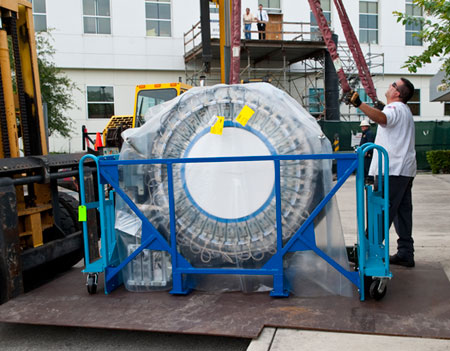
“We hope within the next six months, PET scanning will be approved for the diagnosis of Alzheimer’s disease,” said Dr. David Morgan, PhD, CEO and director of the USF Health Byrd Alzheimer’s Institute. “Basically that means, at least on a private pay basis, we could use the technology prognostically – to identify people in the early stages before they show symptoms of the disease.”
Dr. Michelle Lee Estevez, a geriatrician who recently joined USF Health and will see patients at the Byrd Alzheimer’s Institute, said she was excited to find out that its C.A.R.E. Center will house the PET/CT scan.
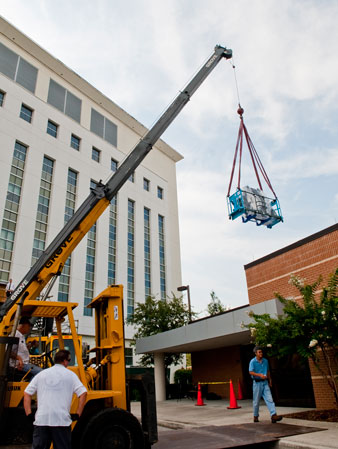
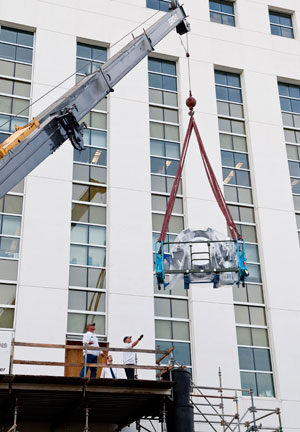
Representatives from USF Health Operations & Facilities Management, GE Healthcare and contracting company Friedrich Watkins were involved in the move’s precision logistics.
“It’s a great resource that gives us the opportunity to image the brain’s function in various stages of Alzheimer’s disease or other dementias,” said Dr. Estevez, an assistant professor of medicine, who worked previously at the Palo Alto Medical Foundation and UCLA’s David Geffen School of Medicine. “The more scans obtained from people in different stages, the better our understanding of the brain and the greater the likelihood of diagnosing the disease earlier and developing personalized treatments.”
Patients will be more apt to take advantage of the PET scan technology if they can conveniently receive the neuroimaging tests at the same place they visit all the specialists involved in their diagnosis and therapy, Dr. Estevez added. “The brand new second-floor clinic will allow them to do that.”
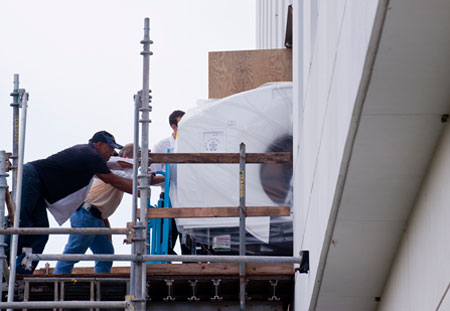
Dr. Amanda Smith, medical director of the Byrd Alzheimer’s Institute, says the new PET/CT scan can be used by researchers and clinicians to study and diagnose a wide range of conditions, including cardiovascular disease, cancer and many brain disorders.
“It’s not just for us, it’s for the whole USF community,” she said.
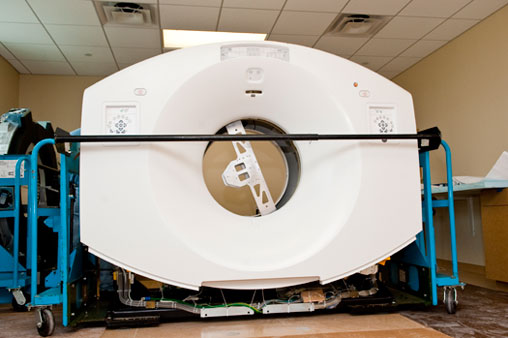
Once inside, the PET/CT scan was ready to be assembled, installed and calibrated.
Video by Amy Mariani, story by Anne DeLotto Baier, and photos by Aimee Blodgett, USF Health Communications

